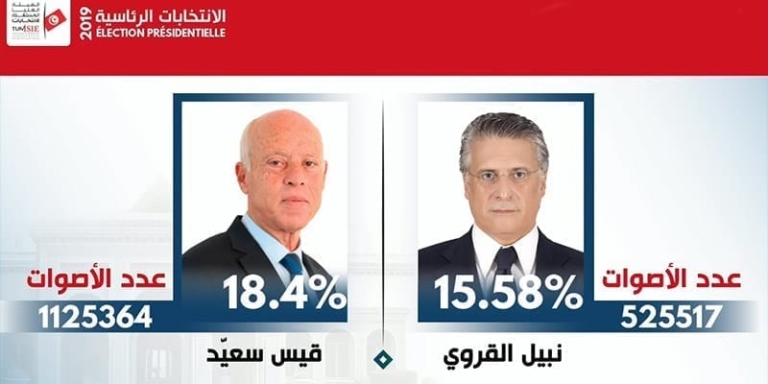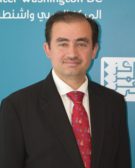
On September 15, Tunisia held the first round of its second presidential election by popular vote after the passing of President Beji Caid Essebsi last July. (The first president after the popular revolution that toppled strongman Zein al-Abidin ben Ali, Moncef al-Marzouki, was elected by the country’s parliament in 2011.) A reported 26 candidates vied for the position this time around, representing Tunisia’s myriad political forces, but also including newcomers to politics and populists professing to address corruption, social ills, and economic challenges.
Surprising Outcome
On September 17, the Independent High Authority for Elections (ISIE) announced what can simply be called surprising results of the first round. Kais Saied, an independent and populist candidate with no history of prior political involvement, received 18.4 percent of the popular vote, the highest percentage in a crowded field of candidates. Second runner-up was media mogul, businessman, and leader of the Heart of Tunisia Party Nabil Karoui––currently detained on tax fraud charges––with 15.5 percent of the vote. Perhaps another surprise was the third place earned by the Islamist Ennahda candidate, Abdelfattah Mourou, who received 12.8 percent, arguably a fraction of what the movement could have mustered. Former Defense Minister Abdul-Kareem Zubaidy, who was the candidate of Essebsi’s Nidaa Tunisia Party, got 10.7 percent while current Prime Minister Youssef Chahed––the candidate of Tahya Tounes (Long Live Tunisia) Party that split from Nidaa Tunisia––got 7.4 percent of the vote. Voter turnout was low, about 45 percent, 19 percentage points down from 2014 when Essebsi was elected.
Kais Saied, an independent and populist candidate with no history of prior political involvement, received 18.4 percent of the popular vote, the highest percentage in a crowded field of candidates.
A run-off will take place before October 23––after appeals of the first results, if there are any, are settled––will be between the top two candidates, Saied and Karoui. But Karoui will be disqualified if he is convicted on his charges and Saied then will face Mourou in the battle for the presidency. If Karoui escapes conviction, that contest shapes up to be very interesting. Saied has already received the endorsement of Ennahda and some other challengers from the first round while Karoui has not been endorsed by any of the losing candidates. What Karoui has left is the support of Tunisia’s secularists whose position may easily be seen as untenable: support Saied and his conservatism or side with Karoui despite his reputation and illegal practices. On the other hand, if Karoui is disqualified, it could be speculated that Mourou may withdraw since his Ennahda Movement has already thrown its weight behind Saied and the secularists will not support his candidacy.
Political Parties Failed
Only 4 percent of voters cast their votes for former President Mohammed Moncef al-Marzouki, 1.8 percent chose former Prime Minister Mehdi Jomaa, and 0.2 percent voted for former Prime Minister Hamadi Jebali, head of the first post-revolution Ennahda Movement government, who ran as an independent this time around. This meant that Tunisians rejected those who participated in political parties or played a political role in the last eight years. Moreover, this rejection worked in favor of Saied, who is an unaffiliated constitutional law professor known for his eloquent Arabic, academic style, and plain demeanor. In other words, Tunisians appeared to choose a non-politician, an outsider, and a novice after years of political wrangling, economic malaise, and uncertainty in the Arab world’s (thus far) only successful movement for change from authoritarianism.
Tunisians appeared to choose a non-politician, an outsider, and a novice after years of political wrangling, economic malaise, and uncertainty in the Arab world’s (thus far) only successful movement for change from authoritarianism.
Saied’s fortunes have cast light on some important facts in today’s Tunisia. The first is that the country may be undergoing a wave of populism like those in the United States, the United Kingdom, Hungary, Brazil, and the Philippines. Neither Donald Trump, for example, nor Jair Balsonaro and Rodrigo Duterte exhibited much political acumen or advocated for detailed electoral platforms when they ran for the presidency. Saied said little about his ideas and stayed focused on cultural issues and fighting corruption, drawing in the process unaffiliated voters and especially the youth. Saied’s slogan during the campaign was the non-committal “The People Want,” while he rejected equality for women in inheritance, proposed by the late Essebsi. Needless to say, this puts him in direct opposition to secularists and leftists in the country who supported the former president when he proposed the change, even though the parliament has not passed the proposal into law.
Secondly, the election exposed the fragility of political parties in Tunisia, or at least those operating since the Arab Spring revolution. While civil society organizations have been quite successful in the country, political parties appeared to be hollow institutions headed by interested elites unable to address pressing problems. Neither are political parties seen as good conduits for youth or efficient platforms for change.
The third Tunisian fact is related to the democratic transition itself. It appears that while many Tunisians approve of the new direction of the country after decades of authoritarian rule, they are disappointed that their economic wellbeing has not seen much improvement. This may affect how they evaluate their democratic experiment, a danger that Tunisian elites would do well to address. With a youth bulge and high rates of unemployment, Tunisia must find the right combination of political and economic reform so that the transition to democracy can continue and democratic institutions can be consolidated.
What Can Be Expected?
Saied’s possible election in the second round may take Tunisia in a different direction than the current organized political forces had hoped for. Indeed, his chances may be higher simply because he has no previous record and his potential opponent Karoui does not have much time to campaign against him from prison. Saied’s becoming president, however, will be an interesting development whereby a constitutional professor becomes the chief executive in an Arab state while other heads of state in the Arab world are either monarchs or former military officers. Only time will tell whether he, if elected, introduces new rules of governance into the Arab political game; rules that emanate solely from the Tunisian democratic experiment instead of as a result of an army coup or palace intrigue.
Kais Saied also supports the implementation of the death penalty, despite international and human rights efforts to abolish it in Tunisia, and stresses the need to apply it in a number of cases that need severe deterrence. He also opposes homosexuality and considers it a foreign import that aims to destroy Islamic society. He is not fond of civil society associations in a society where said organizations are in arguably every social endeavor–– having taken on their missions during long decades of authoritarian rule––and which receive much of their funding from the European Union.
It is these social conditions that make Saied a potential threat to secular freedoms enjoyed by Tunisians. In fact, as Tunisia continues to chart its democratic future, one of the most important challenges is respect for civic and human rights by state organs that may not yet have had the requisite opportunity to fully reform. In the hands of an inexperienced president who may be weak in addressing complicated socio-economic difficulties, such state organs may easily be used to suppress what is seen as unacceptable behavior, mores, and freedoms.
As Tunisia continues to chart its democratic future, one of the most important challenges is respect for civic and human rights by state organs that may not yet have had the requisite opportunity to fully reform.
Finally, as Tunisia tries to sort out its domestic scene over the next few months, it is likely that its foreign policy will experience an arguably needed hiatus. This, of course, will in large part depend on the results of the upcoming legislative elections––set for October 6––which will determine the identity of the future prime minister. That person, predictably, may be one who gets along with a future President Saied, unlike the tenuous relationship that characterized the Essebsi-Chahed relationship over the last three years of democracy in Tunisia.


